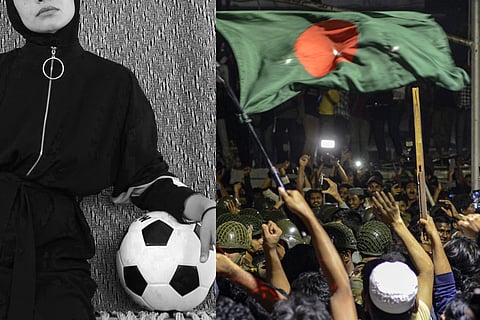

A women’s football tournament in northern Bangladesh was cancelled after Islamist groups protested against the event, labelling it "un-Islamic," the BBC reported. The incident has sparked concerns over the growing influence of religious hardliners in the country, which is currently under an interim administration following the ousting of its previous government.
Seventeen-year-old Asha Roy was among the players who had travelled to Rangpur for the match, only to be sent home by local authorities fearing potential unrest. “I was frustrated and frightened. We had never faced such a situation before,” she told the BBC.
The cancellation was triggered by a demonstration planned by the Islami Andolan Bangladesh, a hardline Islamist group that opposes women playing football. The BBC noted that this was the third time in two weeks that a women’s football match had been scrapped due to pressure from religious extremists.
The incident reflects a growing Islamist influence in Bangladesh. According to the BBC, similar protests have led to clashes elsewhere, including in Dinajpur, where Islamists opposing a match clashed with locals supporting it, leaving four people injured.
The leader of the Islami Andolan Bangladesh, Maulana Ashraf Ali, told the BBC that women should only play in front of female spectators while being fully covered, adding that his group wanted strict Islamic law implemented in the country.
The BBC reported that the cancellation of women’s football matches has sparked a backlash on social media, prompting authorities to reschedule one of the games and investigate the incidents. However, the government has dismissed claims that it is giving in to Islamists.
Shafiqul Alam, press secretary to interim leader Muhammad Yunus, told the BBC that the government remains committed to supporting women’s sports, pointing to the hundreds of matches held nationwide in January. he also added that there is no truth in the allegations that the government is pandering to Islamists.
But concerns persist. Samina Luthfa, a sociology professor at Dhaka University, told the BBC that the growing opposition to women in public spaces was “alarming.” Prominent women’s rights activist Shireen Huq echoed similar fears, warning that if the government does not act, women and girls will face greater intimidation in public life.
The BBC noted that the rise in Islamist activity has coincided with several controversial decisions by the interim government, including lifting a ban on Jamaat-e-Islami and releasing Jashimuddin Rahmani, a convicted leader of an extremist group linked to the killing of secular bloggers.
According to local media reports, several other people accused of having links with extremist groups have also been given bail in the past few months.
Religious hardliners have also targeted cultural and public figures. According to the BBC, Islamists recently vandalised a book stall at the Ekushey Book Fair for displaying works by exiled feminist author Taslima Nasrin. Meanwhile, popular Bangladeshi actor Pori Moni was reportedly prevented from inaugurating a store in Tangail due to objections from religious groups.
Minority groups, including Sufi Muslims, have also come under attack. Anisur Rahman Jafri of the Sufism Universal Foundation told the BBC that around 100 shrines had been vandalised in recent months, warning that Bangladesh was at risk of "Talibanisation" if such incidents continued.
As tensions rise, the BBC reported that rights groups are urging the government to take a stronger stance against Islamist extremism, fearing that growing radicalisation could lead to further restrictions on women and minorities.